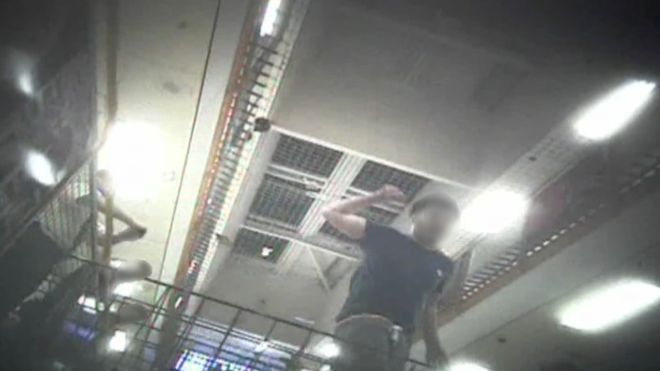Renewed calls for a time limit on immigration detention following shocking BBC Panorama

Covert footage was filmed inside Brook House, near Gatwick Airport (BBC)
There were renewed calls for the introduction of a 28 day time limit on immigration detention following the broadcasting of a shocking BBC Panorama documentary on Monday exposing the desperate conditions for detainees.
Callum Tulley was 18 years old when he started work as a detainee custody officer at Brook House, one of the UK’s 11 immigration detention centres, and a year later he turned whistle-blower and documentary-maker for the BBC. He filmed the detainees and his co-workers in a glimpse of a brutal and toxic atmosphere, caused by the systematic failings of the Home Office to implement their policies and more efficiently process asylum applications.
Drug epidemics, physical abuse and threats run rife at Brook House, built and run like a prison, complete with the same overcrowding issues: the centre is always at full capacity with 500 detainees and there are often only two officers per wing of 100 men, despite Home Office policy being that there should be a presumption of temporary admission or release over detention.
Asylum seekers are placed alongside foreign criminals waiting to be deported, as the Home Office has no policy on segregation. This can mean that vulnerable asylum seekers are subjected to violence and drug abuse as soon as they enter the detention centre.
The violence does not just come from other detainees, however; there were incidents of officers assaulting detainees in their rooms where there is no CCTV. In one particularly disturbing incident, an officer pushed his fingers onto a suicidal detainee’s throat until he was gasping for breath, and told him that he would ‘put [him] to f***ing sleep’. He later told other members of staff to not report his actions, despite Home Office policy stating that the use of force should be documented. One former detainee said in the documentary: ‘They treat [us] like animals.’
This is all compounded by the psychological distress that comes with prolonged and indefinite detention. The UK is the sole country in the European Union that does not place a 28-day time limit on immigration detention.
Many are forced to spend years inside these centres, never knowing when they will leave, thanks to the long-winded processing system for asylum applications and deportation orders. One detainee, who had been detained for nearly two years, is told that he will finally leave the centre – only to be transferred to another one.
The suffering that comes with indefinite waiting manifested itself in high rates of self-harm and even suicide attempts. These are met with indifference from custody officers – an oft-repeated phrase in the documentary was: ‘If he dies, he dies…’ – interjected with mocking and taunting of the detainee.
Those who were vulnerable and/or mentally ill, of which there were many, were met with no understanding or empathy, despite Home Office policies being brought in last year to ostensibly ‘strengthen’ the presumption against detention for vulnerable detainees as well as diagnosis and treatment of mental health issues.
The documentary shed light on why the immigration statistics have remained unchanged over the past five years, despite the introduction of new policies by the Home Office to combat just that.
Just under 28,000 people were detained by the Home Office for immigration purposes between June 2016 and June 2017, with 3,000 of those housed in an immigration detention centre.
More than half of these detainees had been there for longer than 28 days, and there were 271 people who had been in these centres for more than six months. The numbers of long-term detainees, and immigration detainees overall, have remained steady over the years, and the 2017 statistics prove that this is a trend that has failed to wane. In the Detention Forum’s briefing report for this month, it was stated that ‘in too many cases, Home Office practice does not reflect Home Office policy’, and that the mentality is still very much ‘detain first, think later’.
In light of the documentary, G4S, the private security firm that has been paid more than £100 million by the Home Office over eight years to run Brook House, has suspended nine of its staff from the centre. In the results of Brook House’s inspection last year, the centre is deemed to be ‘reasonably good’ and ‘making excellent progress’.






